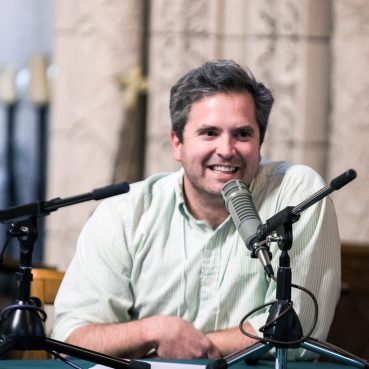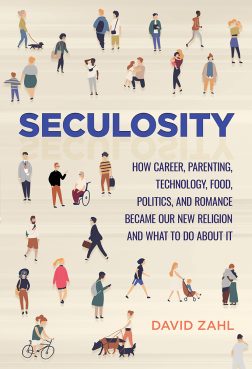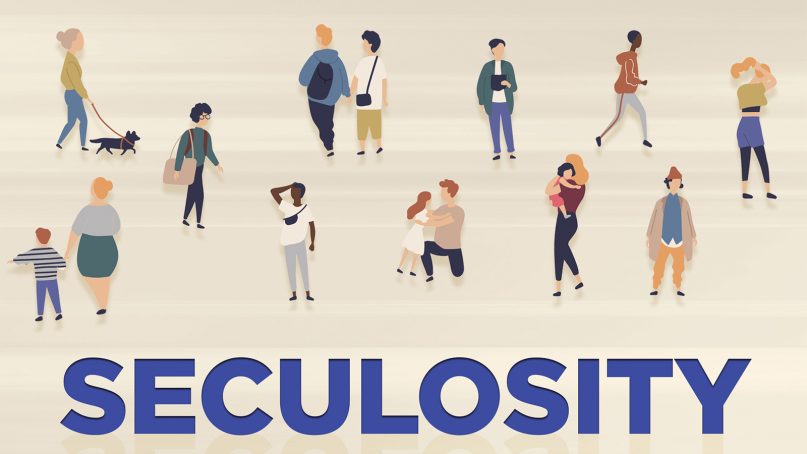(RNS) — A growing number of Americans do not follow a religion.
But chances are that the details of their lives — from their phones and their politics to their dinner plates and how they raise their kids — are still ruled by some sort of a religious impulse, says author David Zahl.
Zahl is the founder of the popular nondenominational Christian Mockingbird Ministries project, which formed 12 years ago to reach out to young adults who felt they had been “burned” by the church. His most recent book, “Seculosity: How Career, Parenting, Technology, Food, Politics, and Romance Became Our New Religion and What to Do About It,” suggests that American culture is not actually becoming more secular at all.
It’s simply becoming more religious about more things, with people increasingly attaching their natural yearning to feel like enough to more and more things.
“If you want to understand what makes someone tick, or why they’re behaving the way they are, trace the righteousness in play, and things will likely become clear,” he writes.
Zahl, who also works for the Christ Episcopal Church in Charlottesville, Virginia, spoke to Religion News Service about the secular religiosities he sees ruling people’s lives and anxieties. This interview has been edited for clarity and length.
Can you define “seculosity” and how you see it play out in the world around you?
It’s a mashup of secular and religiosity. It really refers to what I call religious devotion or religious feeling or even the impulse when it’s directed at earthly rather than heavenly objects. But also I wanted didn’t want to ascribe belief in something divine or supernatural. So that’s why I chose the word seculosity.

Author David Zahl. Photo courtesy of Stellate Photography
Especially as a young parent, I would see codes of behavior, people clinging to something that’s righteous. There’s an orthodox way and almost like a heretical way of raising children. People were constantly at war with each other. You would see a parent at a playground correcting a perfect stranger. And it felt to me like what you would see sometimes in a church event.
So I saw all the young parents around me always get so anxious, like they were being graded all the time.
Are there other areas you see it playing out?
Certainly you see it in things like exercise. I remember being invited to a SoulCycle class, which is the classic example. We’re all facing one direction and we’re standing and we’re kneeling and there’s someone at the front who just starts spouting out witty sayings. But they weren’t just about exercise, they were about betterment and perfection. The community and the ritual that developed around exercise to me felt a lot like the small groups that I had been a part of in churches in the past.
Take something like food. Look at the emphasis on the purity of where ingredients are sourced, what’s being put into you, the way that we used to call it fasting and now we just call it a cleanse. The moral language, the anxiety around food, the fear of getting caught eating fast food — again, the judgments we wield against each other based on diet. It felt like a lot of anxiety. A lot of sense of righteousness was at stake in where people were eating and what they were eating and there was a lot of hiding. And any time there’s hiding there is usually some form of judgment or condemnation that people are afraid of.
I can go on and on. T.S. Eliot once said half the harm that is done in this world is by people who are absorbed in the “endless struggle to think well of themselves.” A lot of times we turn to these seculosities to make us feel better about ourselves but they end up making us feel worse.
Do you see the proliferation of social media and technology as exacerbating seculosity? Perhaps in the ways people present certain kinds of images of themselves online?

“Seculosity: How Career, Parenting, Technology, Food, Politics, and Romance Became Our New Religion and What to Do About It” by David Zahl. Image courtesy of Fortress Press
Absolutely.
But I don’t think this tendency is something that’s invented by social media or technology. Church people have always felt that there was sort of Sunday face that you would put on where everyone was sort of shiny and happy sitting in church wearing nice clothes and got the sense that everything was going well. Then there was the rest of the week where you were just who you were. That phenomenon of like a “Sunday face” versus the “rest of the week face” — that’s social media to me.
It’s the gap between who you should be and who you actually are, which creates a lot of dissonance and a lot of, again, anxiety but also loneliness.
And the comparisons that people make each other jump through, it’s pretty merciless. In the church, there was a backdrop of sin and the idea that people are not perfect. Without that you just have pressure to curate and put up a happy face or sophisticated face or effortlessly sophisticated face at all times. That’s really daunting. There’s some real spiritual and emotional fallout in that.
Do you think people of faith are less prone to seculosity?
In a lot of ways — I call it Jesusland, the kind of bastardized form of Protestant Christianity that dominated a lot of the West, or at least America — it resembles seculosity much more than medieval Christianity or Reformation Christianity or first-century Christianity.
It’s a lot about church as the place to assert or earn righteousness, rather than a place to receive it.
Speaking myself as someone who is involved in a couple of churches, I found myself very, very, very much prone to seculosity and everything I describe in the book.
So I don’t know. Seculosity is not so much about worship so much as self-justification, like where people are finding their sense that they’re justified, they’re enough, they’re OK.
That’s part of what religion is about, a sort of guilt management system where you end up offloading your guilt or your shame, receiving some sort of better sense of yourself. People are very much doing the same thing. When the seculosities exhaust you, when they beat you into the total nervous wreck, that’s usually when you find real faith, something that’s not based in your performance.
What message do you hope religious and nonreligious people will walk away with?
One of the things I wanted to do in the book was not give people another set of things to feel like they’re failing at. I really wanted to point to whatever it is, wherever it is, a person finds some form of grace — that can be in the form of forgiveness, mercy, love in the midst of deserving something else.
That is what I hope and pray people will cling to and value a little bit more deeply. Because you’re not going to get it from your bank account or social media. We’re not going to get the gift of humanizing and absolving like that. But I think we all tend to have something that functions in that way in our life, and I hope we can figure out a way to stay closer to it.
Can houses of worship aid in that journey?
I do have some prescriptions for what I think it would take for religion in this country to function again in that way, as a religion of grace rather than one that drives exhaustion and hypocrisy and perfectionism. We have to evaluate our relationship to our performance, to find some sense of dignity in our being rather than our doing.
It’s a little cliché, perhaps, but I think one thing that would help is talking a bit more about death. So much of that anxiety that I’m describing is stuff that you don’t think about on your deathbed. Ultimately, death is the great equalizer. And I think that it actually, instead of being morose, it shows us that our performance really isn’t the most important thing going on in life. Our relationships are more important.
You realize that everyone already feels like a failure. We all have some sort of treadmill that we’re running on. People are suffering under enormous burdens of who they should be. And what would it look like for our houses of faith to be places you go when you mess up rather than places you flee from when you have?
Religion at its best has been a place where we can go to with our guilt and our shame.
When you cut religion out of your life, a lot of times it looks like you’re cutting out the oppressive part, the mandates. But when you do that you’re also cutting off the forgiveness.
Clergy used to be your local forgiveness person. Wouldn’t it be beautiful if our houses of worship were places we could go to unload, to atone, to be refreshed, to receive hope beyond your performance that day?





